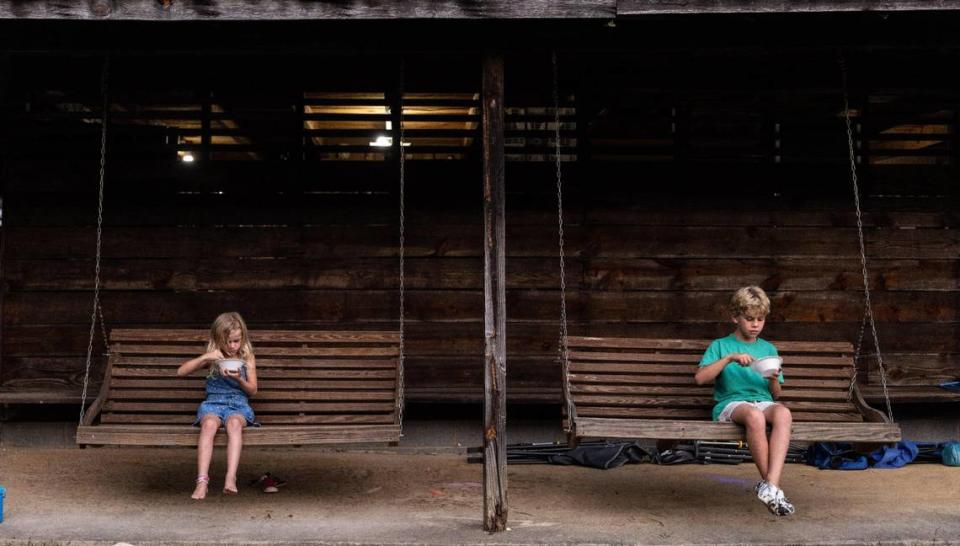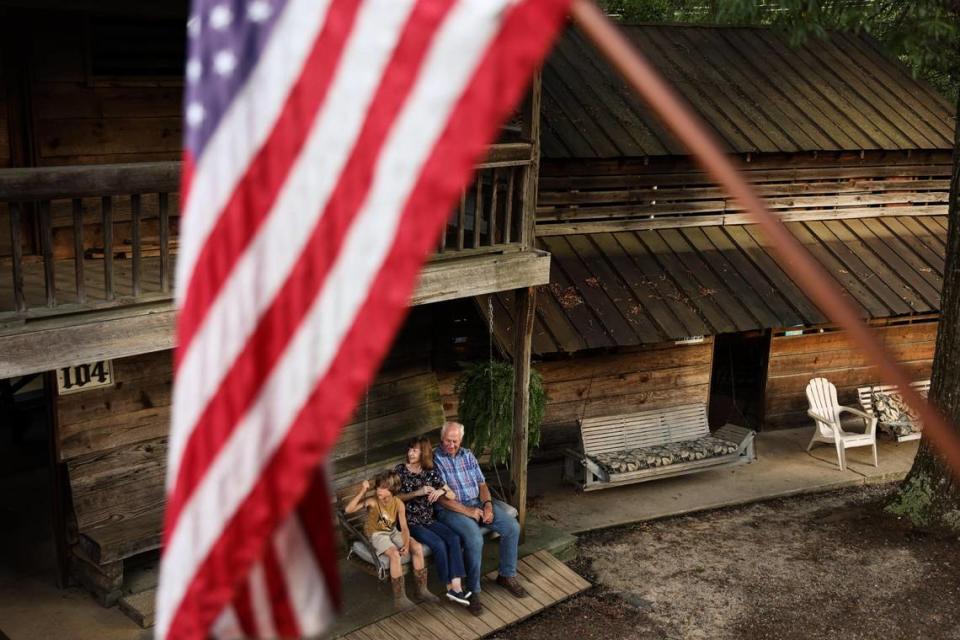This religious tradition in NC is 200+ years old. Will young people keep it going?
To the untrained eye, the wooden structures at Rock Springs Campground in Denver look worn, but for two weeks in August many people call it home.
The site is one of the oldest ongoing religious traditions in North Carolina, colloquially known as camp meeting. For more than 200 years, families have gathered there to worship. These days, it’s a destination where they come from near and far, evolving from a bygone era where settlers in covered wagons sought religious revival.
But waning membership, selling of camp assets and a lack of engagement from youth now places camp meeting’s existence in jeopardy. A separate branch, called Tucker’s Grove, which draws mostly Black attendees, may also be on its last legs, as leaders hope to get more young people involved.
Camp meetings around the state began in the late 18th century, where Methodist “churchgoers congregated in rural camps for an extended length of time to live and worship together,” Lynne S. Lepley wrote for NCPedia, a website managed by the North Carolina Government & Heritage Library at the State Library of North Carolina.
“The events were born out of the spiritual and social needs of a people who lived a basically isolated existence on the frontier and embraced any opportunity to gather in community,” Lepley wrote. “They were also a natural outgrowth of the spiritual revivalism that swept through America in the early and mid-eighteenth century.”
The first sermons
Rock Springs Camp Meeting traces its origins back to Daniel Asbury, a pioneer from Virginia and Methodist minister who held religious services in Terrell, a community six miles northeast of Denver in Iredell County. Individual sermons would sometimes last several hours, and when a preacher was done with one, another would immediately take his place.
The services were held in the woods under a brush arbor. As many as 20,000 attendees slept in cloth tents and covered wagons.
After three years in Terrell, the event was relocated to Lincoln County and moved to Rock Springs Campground in 1829. A few years later, more than 200 wooden structures called “tents” were constructed for families to stay in during the two-week revival.
Keeping the tradition alive
These days, during the first two weeks in August, when summer temperatures have reached their peak, hundreds of people flock to Rock Springs Campground. They frequent Bible study in the morning and worship services in the evening underneath a carefully constructed wooden arbor.
Outside of worship, throngs of children play whiffle ball, soccer, or blow bubbles on one the signature porch swings nearly every tent is adorned with. People can buy food at the on-site cafe known as “The Shack,” which serves hamburgers, hot dogs, ice cream and more, or cook from the comfort of their own tents.
Winston-Salem resident Vicki Kopf, who has attended camp meetings at Rock Springs since she was an infant, recalled a simpler time. The schedule of events wasn’t as refined, but just as many people attended.
“It wasn’t nearly as manicured as it is now,” Kopf said. “It was a little more rough and tumble.”

The wooden tents that resemble the earliest versions of modern townhomes, weren’t always as sophisticated as they are now, Kopf said. Though they were eventually replaced, the floors consisted of hay, and many of them lacked running water and electricity.
Kopf said her family has owned a tent at Rock Springs since 1832 – three years after camp meetings first began there.
In recent years, however, a few tents have been listed for sale for as high as $35,000, according to the Rock Springs Camp Meeting Facebook group. Sales could signal waning interest in staying there during revivals.
Data also show that church membership is declining among millennials, which could jeopardize attendance at Rock Springs.
A 2020 Gallup poll shows that only a third of millennials belonged to a church, down from more than 50% a decade before. Nearly twice as many adults older than 76, and 58% of those born between 1946 and 1964 belonged to a church then, according to the data.
Kopf, who is 72, admitted she has discussed whether the tradition of camp meeting at Rock Springs will continue with her family, but said she’s optimistic about its future.
“There are an awful lot of teenagers, and of course young kids, that come and I think it’s just part of what they’re going to continue to do,” Kopf said. “I’m not really worried about it. I think it’ll keep going on.”
Longtime camp meeting attendee Kathy Paz echoed Kopf’s sentiments, a few days after most of her extended family – including 15 of her grandchildren – gathered together at the campground to worship.
“We consider it a family reunion,” said Paz. “My family, and a lot of the people that live in this area, will definitely continue coming.”
Paz’ daughter, Celeste Caso, who lives in southern California, plans a trip to the event nearly every year.
Caso explained her evolution of camp meeting attendance, from looking forward to as a child, to being “over it,” after going to college, then growing to appreciate the event again as a parent.
“Once our generation was the age that our parents were when they were bringing us, well that’s why we have such a packed tent now,” Caso said. “We have so many fond memories of camp meeting as a child.”

A return to normalcy and sense of urgency
Seven miles southwest of Rock Springs lies Tucker’s Grove Campground in Iron Station, a site where many Black Lincoln County residents have held camp meeting since 1874, after slavery ended.
According to the Rock Springs Camp Meeting website, white and Black families once attended the event together in Denver, until Tucker’s Grove was constructed.
Tucker’s Grove sports many of the same elements as Rock Springs, with hundreds of wooden tents that surround an arbor where worship services take place near the end of August — with plenty of food to enjoy.
Camp meeting at Tucker’s Grove had been operating continuously since the late 19th century. The COVID-19 pandemic halted many large social gatherings, with the event called off in 2020, and again the following year.
This year, crowds have returned to pre-pandemic levels. It’s an indication that attendees, including his 99-year-old aunt, are learning to live with the virus, says Lewis McLean, who chairs the campground’s board of trustees.
However, McLean pointed out that nearly 40 regular attendees died in the years since the pandemic began, though not all were COVID-related.
“A lot of people didn’t wear masks, so they felt a little bit more comfortable,” said McLean. “But they were happy to know that we had masks available.”
Despite some sense of normalcy, McLean said a key demographic has been dwindling for some time at the campground, even before the pandemic: young people.
“That’s what scares me,” McLean said, adding that more young people need to get involved to keep the tradition afloat. “That’s why we’ve been trying to get younger trustees in to help out.”
The board of trustees attempted to attract young people by inviting a gospel rapper to perform at the campground, McLean said, which seemed to work — until the show was over.
“As soon as he got finished, they dispersed,” McLean said, referring to the people who showed up to the performance. “I don’t know if it’s more of the religious part that they’re not feeling, or if they just want to meet with their friends.”
The decline in attendance could be due, in part, to the lack of church membership among Black millennials.
Data from the Gallup poll show that church membership among Black millennials declined by 19% in the last 20 years, while membership among white millennials dropped by 16%.
McLean, who is 54 years old, said he and the other trustees of Tucker’s Grove could use some help from the next generation to run the event. He knows won’t be able to do it forever.
“I’ve been running it for a while now,” said McLean. “When I’m trying to prepare this thing and get it together , but by the time camp meeting starts, I’m so exhausted that I can’t even enjoy it.”
“Somebody has to take over,” he added. “I’m going to die one day, or something is going to happen to me. Who’s going to take over? That’s where we are right now.”

